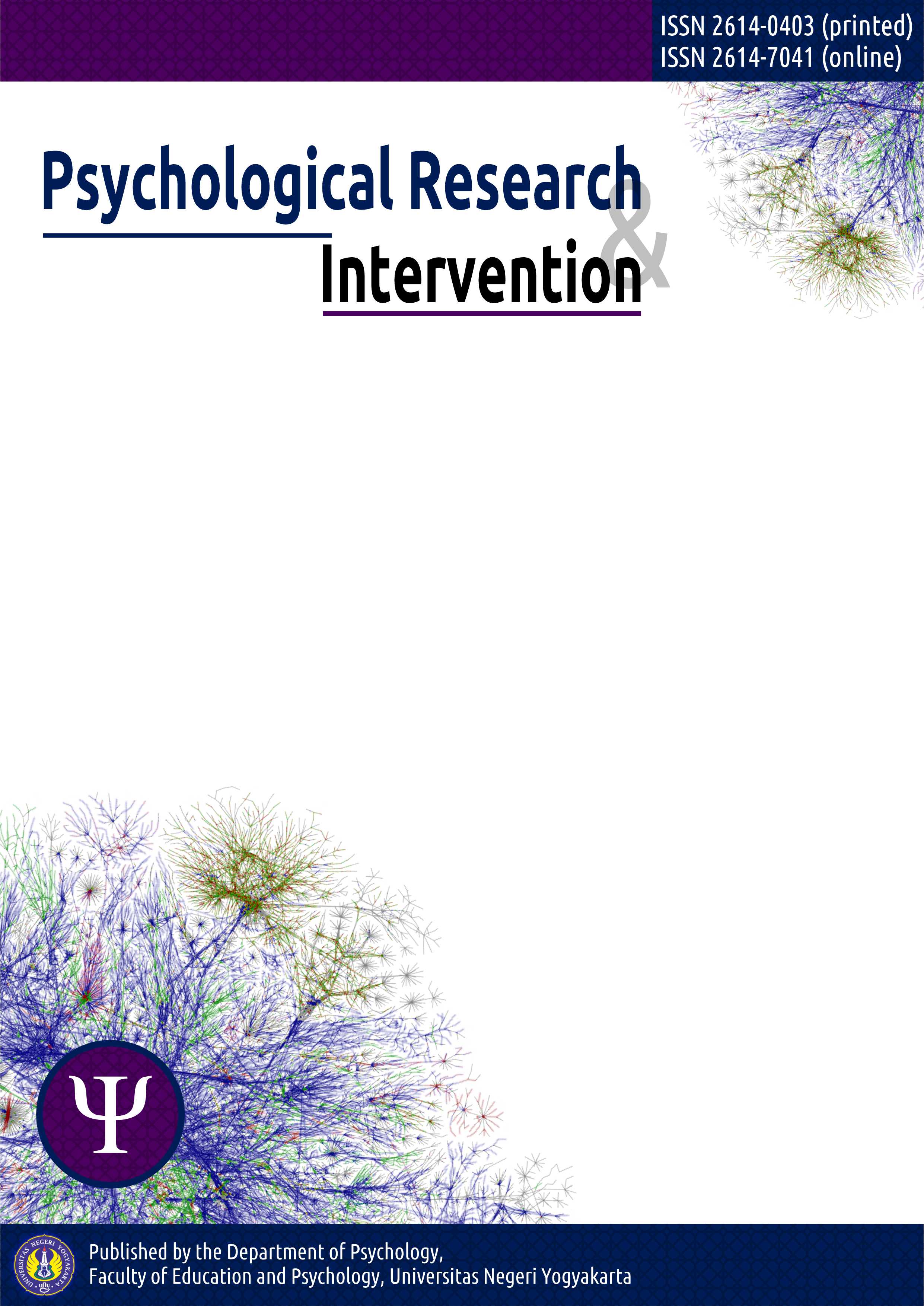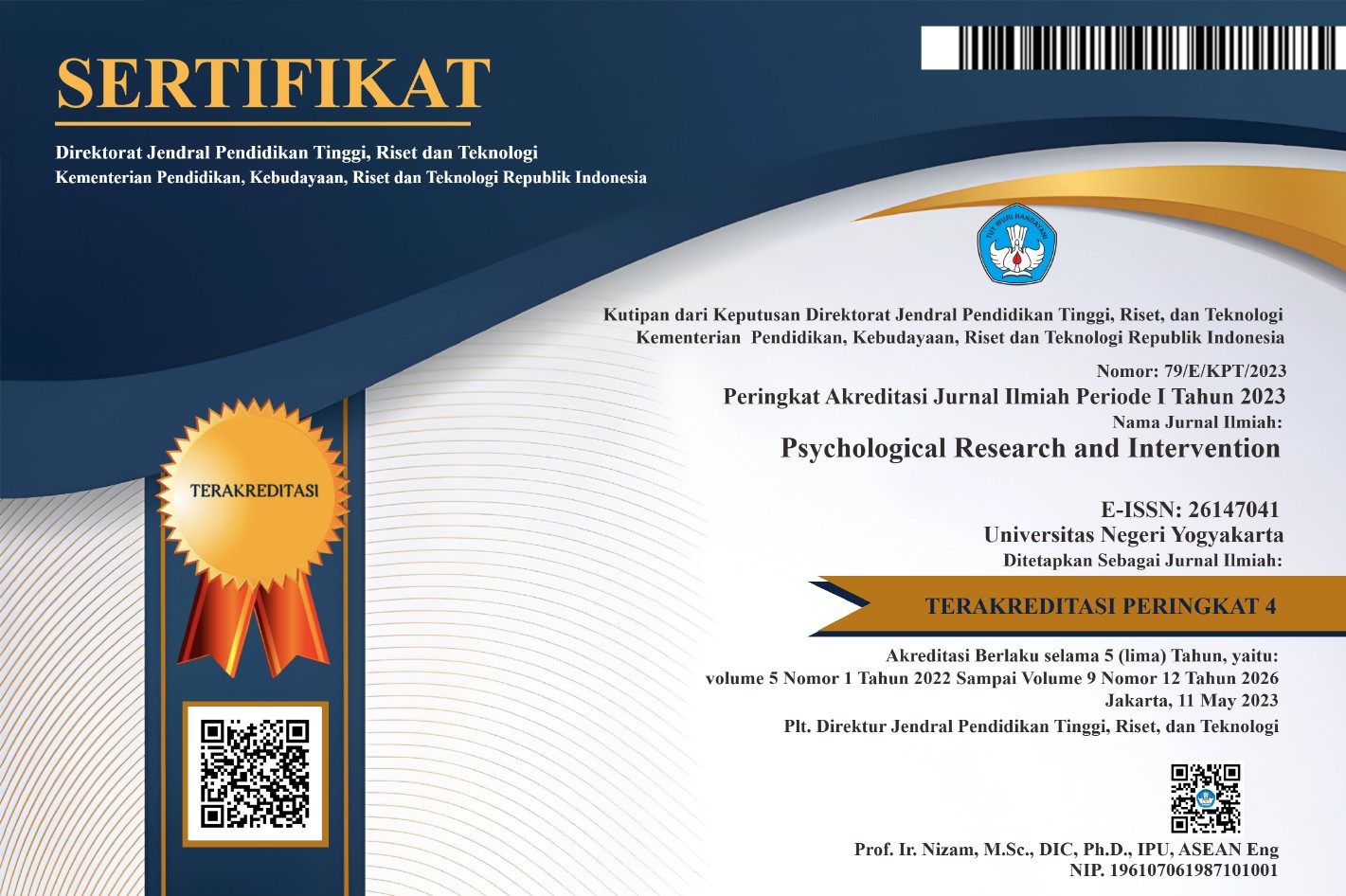Improving Mental Health during the COVID-19 Pandemic through Online Psychoeducation
DOI:
https://doi.org/10.21831/pri.v3i2.41385Abstract
The COVID-19 pandemic alters many aspects of everyday life that we have grown accustomed to. The enactment of various new policies to curb the spread of the disease, i.e., social distancing, work and study from home, restrictions on large-scale activities and restriction in travelling, compel each one of us to adjust. Not to mention the fear of being infected with COVID-19. These conditions led to various psychological problems such as anxiety, low hope, and negative emotions. Efforts to improve people's mental health are urgently needed. One such step is to increase one's understanding of self-management in facing psychological problems due to COVID-19. This study aims to improve the community's mental health, namely the residents of Blotan hamlet during the COVID-19 pandemic through online self-management psychoeducation. To test the effectiveness of psychoeducation, this study used a one-group pre and post-test design. A total of 31 subjects participated in the activity in full. We can infer the effectivity through the anxiety score, hope, and positive emotions on the pre and post-test measurements. The results found that self-managed psychoeducation facing psychological problems during the pandemic significantly increased positive emotions (t = -2,753, df = 30, and p <.05). As for the measurement of anxiety and hope, there was no significant change due to the subject's anxiety score and hope were already in the medium category.
References
Donker, T., Griffiths, K. M., Cuijpers, P., & Christensen, H. (2009). Psychoeducation for depression, anxiety and psychological distress: A meta-analysis. BMC Medicine, 7, 1–9. https://doi.org/10.1186/1741-7015-7-79
Fredrickson, B. L., Tugade, M. M., Waugh, C. E., & Larkin, G. R. (2003). What good are positive emotions in crises? A prospective study of resilience and emotions following the terrorist attacks on the United States on September 11, 2001. Journal of Personality and Social Psychology, 84(2). https://doi.org/10.1037/0022-3514.84.2.365
Grover, S., Dua, D., Sahoo, S., Mehra, A., Nehra, R., & Chakrabarti, S. (2020). Why all COVID-19 hospitals should have mental health professionals: The importance of mental health in a worldwide crisis! Asian Journal of Psychiatry, 51(April), 102147. https://doi.org/10.1016/j.ajp.2020.102147
Ho, C. S., Chee, C. Y., & Ho, R. C. (2020). Mental Health Strategies to Combat the Psychological Impact of COVID-19 Beyond Paranoia and Panic. Annals of the Academy of Medicine, Singapore, 49(1), 1–3.
Kaur, S., Kaul, P., & Zadeh, P. M. (2020). Monitoring the Dynamics of Emotions during COVID-19 Using Twitter Data. Procedia Computer Science, 177, 423–430. https://doi.org/10.1016/j.procs.2020.10.056
Khan, A. H., Sultana, M. S., Hossain, S., Hasan, M. T., Ahmed, H. U., & Sikder, M. T. (2020). The impact of COVID-19 pandemic on mental health & wellbeing among home-quarantined Bangladeshi students: A cross-sectional pilot study. Journal of Affective Disorders, 277(June), 121–128. https://doi.org/10.1016/j.jad.2020.07.135
Li, S., Wang, Y., Xue, J., Zhao, N., & Zhu, T. (2020). The Impact of COVID-19 Epidemic Declaration on Psychological Consequences : A Study on Active Weibo Users. Environmental Research and Public Health, 17. https://doi.org/http://dx.doi.org/10.3390/ijerph17062032
Liu, N., Zhang, F., Wei, C., Jia, Y., Shang, Z., Sun, L., Wu, L., Sun, Z., Zhou, Y., Wang, Y., & Liu, W. (2020). Prevalence and predictors of PTSS during COVID-19 outbreak in China hardest-hit areas: Gender differences matter. Psychiatry Research, 287, 112921. https://doi.org/https://doi.org/10.1016/j.psychres.2020.112921
Long, C. G., Fulton, B., & Dolley, O. (2015). Using psychoeducation to motivate engagement for women with personality disorder in secure settings. Journal of Psychiatric Intensive Care, 11(01), 18–26. https://doi.org/10.1017/s1742646413000344
Marteau, T. M., & Bekker, H. (1992). The development of a six"item short"form of the state scale of the Spielberger State"”Trait Anxiety Inventory (STAI). British Journal of Clinical Psychology, 31(3), 301–306. https://doi.org/10.1111/j.2044-8260.1992.tb00997.x
Peterson, C., & Seligman, M. E. P. (2004). Character strengths and virtues: A handbook andclassification. American Psychological Association.
Restubog, S. L. D., Ocampo, A. C. G., & Wang, L. (2020). Taking control amidst the chaos: Emotion regulation during the COVID-19 pandemic. Journal of Vocational Behavior, 119(May), 1–6. https://doi.org/10.1016/j.jvb.2020.103440
Rummel-Kluge, C., Pitschel-Walz, G., & Kissling, W. (2009). Psychoeducation in anxiety disorders: Results of a survey of all psychiatric institutions in Germany, Austria and Switzerland. Psychiatry Research, 169(2), 180–182. https://doi.org/10.1016/j.psychres.2008.10.016
Snyder, C. R. (2000). Handbook of hope: Theory, measures, and applications. Academic Press.
Spielberger, C. D., & Reheiser, E. . (2004). Measuring anxiety, anger, depression, and osity as emotional states and personality traits with the STAI, STAXI, and STPI. In M. J. Hilsenroth & D. L. Segal (Eds.), Comprehensive handbook of Psychological assessment. John Wiley& Sons, Inc.
World Health Organization. (2020a). Update on coronavirus disease in Indonesia. April 14.
World Health Organization, W. H. O. (2020b). Coronavirus disease (COVID-19) Pandemic. April 14.
Xia, J., Meng, Y., Wen, F., Li, H., Meng, K., & Zhang, L. (2020). Caring for anxiety among adults in the face of COVID-19: A cross-sectional online survey. Journal of Affective Disorders Reports, 1(September), 100014. https://doi.org/10.1016/j.jadr.2020.100014
Yu, Y., Yu, Y., & Li, B. (2020). Effects of mindfulness and meaning in life on psychological distress in Chinese university students during the COVID-19 epidemic: A chained mediation model. Asian Journal of Psychiatry, 53, 102211. https://doi.org/10.1016/j.ajp.2020.102211
Zsido, A. N., Teleki, S. A., Csokasi, K., Rozsa, S., & Bandi, S. A. (2020). Development of the short version of the spielberger state"”trait anxiety inventory. Psychiatry Research, 291(January), 113223. https://doi.org/10.1016/j.psychres.2020.113223












